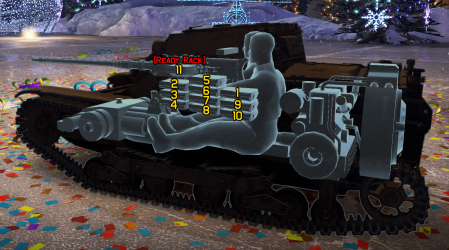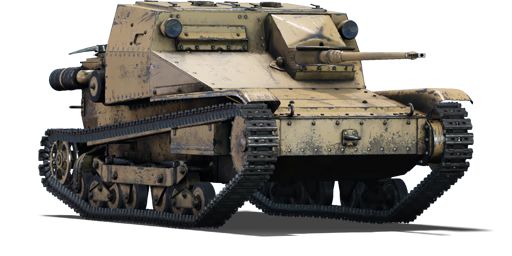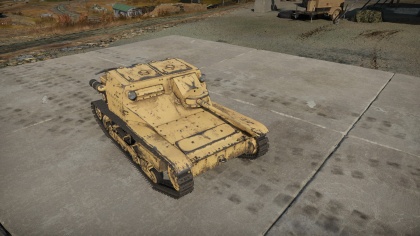Difference between revisions of "L3/33 CC"
Inceptor57 (talk | contribs) m (→Main armament) |
(→History) |
||
| Line 154: | Line 154: | ||
The '''Carro Veloce L3/33''', also known as the '''CV-33''' was a [[wikipedia:Tankette|tankette]] produced by Carro Veloce for the Regio Esercito beginning in 1933. The design was an adaptation of the British [[wikipedia:Carden_Loyd_tankette|Carden Loyd tankette]], which had seen wide success on the international export market and became the basis for a number of similar tankette designs throughout the 1930's. Because Italy lacked the industrial base to produce large numbers of more complex and advanced tank designs, the L3/33 and later [[wikipedia:L3/35|L3/35 tankette]] formed the backbone of the Italian armored corps and became the most widely produced Italian armored fighting vehicles of the war, seeing service from the Italian invasion of Ethiopia to the very end of WW2. Several variants were produced, including a flamethrower variant (the L3/33 FL, standing for "Lanciaflamme"), a bridge carrier variant and a command radio variant. | The '''Carro Veloce L3/33''', also known as the '''CV-33''' was a [[wikipedia:Tankette|tankette]] produced by Carro Veloce for the Regio Esercito beginning in 1933. The design was an adaptation of the British [[wikipedia:Carden_Loyd_tankette|Carden Loyd tankette]], which had seen wide success on the international export market and became the basis for a number of similar tankette designs throughout the 1930's. Because Italy lacked the industrial base to produce large numbers of more complex and advanced tank designs, the L3/33 and later [[wikipedia:L3/35|L3/35 tankette]] formed the backbone of the Italian armored corps and became the most widely produced Italian armored fighting vehicles of the war, seeing service from the Italian invasion of Ethiopia to the very end of WW2. Several variants were produced, including a flamethrower variant (the L3/33 FL, standing for "Lanciaflamme"), a bridge carrier variant and a command radio variant. | ||
| − | As the war progressed, and the Italians faced the Allies in France and North Africa with their more heavily armed and armored tanks and long-range anti-tank guns, the deficiencies of the L3/33 and 35 became apparent. Although fast and possessing a low profile, it was too thinly armored, capable of only withstanding infantry rifle caliber munitions. In addition, its standard armament of a 6.5mm machine gun proved inadequate for long-range combat or engaging other armored vehicles. While the Regio Esercito began slowly upgrading its armored units to more modern standards, stopgap solutions to make up for the difference were considered and adopted. One of these was to mount a [[Fucile Controcarri S Mod.39 (20 mm)]] in a small number of L3/33's and 35's, replacing the 6.5mm machine gun and creating an ad-hoc tank destroyer platform. These were designated as the '''L3/33 CC''', which stood for "contocarro" ("anti-tank"). Arriving too late to see action in Libya before the Axis retreat, they saw only limited action in Tunisia. Gradually, the L3/33 and L3/35 would be withdrawn from front line service, serving largely in behind-the-line roles such as artillery towing vehicles and police vehicles in Axis-occupied territories. | + | As the war progressed, and the Italians faced the Allies in France and North Africa with their more heavily armed and armored tanks and long-range anti-tank guns, the deficiencies of the L3/33 and 35 became apparent. Although fast and possessing a low profile, it was too thinly armored, capable of only withstanding infantry rifle caliber munitions. In addition, its standard armament of a 6.5mm machine gun proved inadequate for long-range combat or engaging other armored vehicles. While the Regio Esercito began slowly upgrading its armored units to more modern standards, stopgap solutions to make up for the difference were considered and adopted. One of these was to mount a [[Fucile Controcarri S Mod.39 (20 mm)]] in a small number of L3/33's and 35's, replacing the 6.5mm machine gun and creating an ad-hoc tank destroyer platform. These were designated as the '''L3/33 CC''', which stood for "contocarro" ("anti-tank"). Arriving too late to see action in Libya before the Axis retreat, they saw only limited action in Tunisia. Gradually, the L3/33 and L3/35 would be withdrawn from front line service, serving largely in behind-the-line roles such as artillery towing vehicles and police vehicles in Axis-occupied territories. After the Axis’s fell, many tanks were captured and either destroyed or repurposed. The last recorded use of an l3/33 in service was during the Iraqi war, where the US captured the tank. |
== Media == | == Media == | ||
Revision as of 15:13, 3 June 2019
Contents
Description
The Carro Armato L3 Contro Carro (shortened to L3/33 CC) is a rank I Italian tank destroyer
with a battle rating of 1.0 (AB/RB/SB). It was introduced in Update 1.85 "Supersonic".
The L3/33 CC is an Italian tank that is the Warthunder Equivalent of a Shoebox on tracks with a gun. This vehicle has very little armour which allows for it to quickly and deftly maneuver the battlefield, scouting for pockets to position the vehicle for tactical advantages against the slower and heavier enemy vehicles at a close range.
General info
Survivability and armour
| Armour | Front (Slope angle) | Sides | Rear | Roof |
|---|---|---|---|---|
| Hull | 8 mm (79°) Front glacis 14 mm (0°) Lower glacis |
14 mm | 8 mm (0-32°) | 8 mm 5 mm Hatches |
| Superstructure | 14 mm (13-64°) 14 mm (0-62°) Gun mantlet |
14 mm (0-15°) | 14 mm (0-17°) | 8 mm 5 mm Hatches |
Mobility
Write about the mobility of the ground vehicle. Estimate the specific power and manoeuvrability, as well as the maximum speed forwards and backwards.
Armaments
Main armament
Wielding an anti-tank rifle with a 10 round magazine capable of launching a small APHE every second, the L3/33, in the hands of a competent commander, is able to deal with multiple lightly-armored vehicles in quick succession. The only thing holding this quick-firing gun back is a lack of effective penetration to deal with any tank at it's battle rating, requiring the commander of this vehicle to be up close and personal and/or flanking to deal with well-armored targets (M3 Stuart, Pz.38(t) F, T-70) and even avoid certain heavy targets (B1 bis) altogether.
| 20 mm Fucile Controcarri S Mod.39 | |||||
|---|---|---|---|---|---|
| Capacity (Belt capacity) | Fire rate (shots/minute) |
Vertical guidance |
Horizontal guidance |
Stabilizer | |
| 110 (10) | 60 | ±15° | ±10° | Vertical | |
| Turret rotation speed (°/s) | |||||
| Mode | Stock | Upgraded | Prior + Full crew | Prior + Expert qualif. | Prior + Ace qualif. |
| Arcade | 17.6 | __.__ | __.__ | __.__ | __.__ |
| Realistic | 11.9 | __.__ | __.__ | __.__ | __.__ |
| Reloading rate (seconds) | |||||
| Stock | Prior + Full crew | Prior + Expert qualif. | Prior + Ace qualif. | ||
| 7.8 | __.__ | __.__ | __.__ | ||
Ammunition
| Penetration statistics | |||||||
|---|---|---|---|---|---|---|---|
| Ammunition | Type of warhead |
Penetration in mm @ 0° Angle of Attack | |||||
| 10m | 100m | 500m | 1000m | 1500m | 2000m | ||
| Perforante mod.35 | APHE | 40 | 38 | 29 | 20 | 14 | 10 |
| Shell details | ||||||||||
|---|---|---|---|---|---|---|---|---|---|---|
| Ammunition | Type of warhead |
Velocity in m/s |
Projectile Mass in kg |
Fuse delay
in m: |
Fuse sensitivity
in mm: |
Explosive Mass in g (TNT equivalent): |
Normalization At 30° from horizontal: |
Ricochet: | ||
| 0% | 50% | 100% | ||||||||
| Perforante mod.35 | APHE | 832 | 0.14 | 1.3 | 15 | 1.7 | ° | 47° | 60° | 65° |
Ammo racks

| Full ammo |
1st rack empty |
2nd rack empty |
3rd rack empty |
4th rack empty |
5th rack empty |
6th rack empty |
7th rack empty |
8th rack empty |
9th rack empty |
10th rack empty |
11th rack empty |
Visual discrepancy |
|---|---|---|---|---|---|---|---|---|---|---|---|---|
| 11 | 10 (+1) | 9 (+2) | 8 (+3) | 7 (+4) | 6 (+5) | 5 (+6) | 4 (+7) | 3 (+8) | 2 (+9) | 1 (+10) | 0 (+11) | No |
Usage in battles
The L3/33 CC is best used in ambushes, as this tactic allows it to strike from close distance; an hill can provide a nice spot for this, as the L3 has 15 degrees of gun depression and can get to cover by simply reversing if it is spotted in time.
Pros and cons
Pros:
- Small enough vehicle profile to utilize a variety of cover in the field
- Due to its small surface area, it is very easy to almost be completely cover in bushes, making it very hard to spot in most maps when standing still
- Great gun depression (-15°)
Cons:
- Main gun difficult to use on all but soft targets over 400 m away
- Almost non existent armour, can be pierced by .50 MG from the front
- 2 man crew
History
The Carro Veloce L3/33, also known as the CV-33 was a tankette produced by Carro Veloce for the Regio Esercito beginning in 1933. The design was an adaptation of the British Carden Loyd tankette, which had seen wide success on the international export market and became the basis for a number of similar tankette designs throughout the 1930's. Because Italy lacked the industrial base to produce large numbers of more complex and advanced tank designs, the L3/33 and later L3/35 tankette formed the backbone of the Italian armored corps and became the most widely produced Italian armored fighting vehicles of the war, seeing service from the Italian invasion of Ethiopia to the very end of WW2. Several variants were produced, including a flamethrower variant (the L3/33 FL, standing for "Lanciaflamme"), a bridge carrier variant and a command radio variant.
As the war progressed, and the Italians faced the Allies in France and North Africa with their more heavily armed and armored tanks and long-range anti-tank guns, the deficiencies of the L3/33 and 35 became apparent. Although fast and possessing a low profile, it was too thinly armored, capable of only withstanding infantry rifle caliber munitions. In addition, its standard armament of a 6.5mm machine gun proved inadequate for long-range combat or engaging other armored vehicles. While the Regio Esercito began slowly upgrading its armored units to more modern standards, stopgap solutions to make up for the difference were considered and adopted. One of these was to mount a Fucile Controcarri S Mod.39 (20 mm) in a small number of L3/33's and 35's, replacing the 6.5mm machine gun and creating an ad-hoc tank destroyer platform. These were designated as the L3/33 CC, which stood for "contocarro" ("anti-tank"). Arriving too late to see action in Libya before the Axis retreat, they saw only limited action in Tunisia. Gradually, the L3/33 and L3/35 would be withdrawn from front line service, serving largely in behind-the-line roles such as artillery towing vehicles and police vehicles in Axis-occupied territories. After the Axis’s fell, many tanks were captured and either destroyed or repurposed. The last recorded use of an l3/33 in service was during the Iraqi war, where the US captured the tank.
Media
Live.Warthunder
Skins and camouflages for the L3/33 CC from live.warthunder.com.
See also
Links to the articles on the War Thunder Wiki that you think will be useful for the reader, for example:
- reference to the series of the vehicles;
- links to approximate analogues of other nations and research trees.
External links
| Italy tank destroyers | |
|---|---|
| Italy | |
| M41 | 75/18 M41 · 75/32 M41 · 90/53 M41M |
| M42 | 75/34 M42 |
| M43 | 105/25 M43 · M43 "G.C.Leoncello" · 75/34 M43 · 75/46 M43 |
| Wheeled | Lancia 3Ro (100/17) · AS 42/47 · Breda 90/53 · Breda 501 |
| Other | L3/33 CC · 47/32 L40 |
| Germany | ▄StuG III G |
| USA | M36B1 · ▄M109G · M113A1 (TOW) |
| Hungary | |
| Zrínyi | Zrinyi I · Zrinyi II |
| USSR | ◔2S1 |





